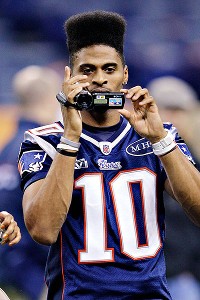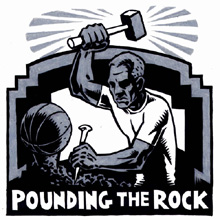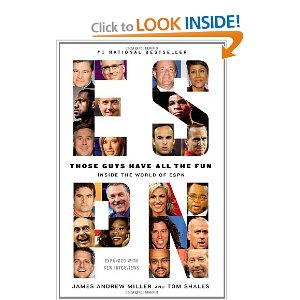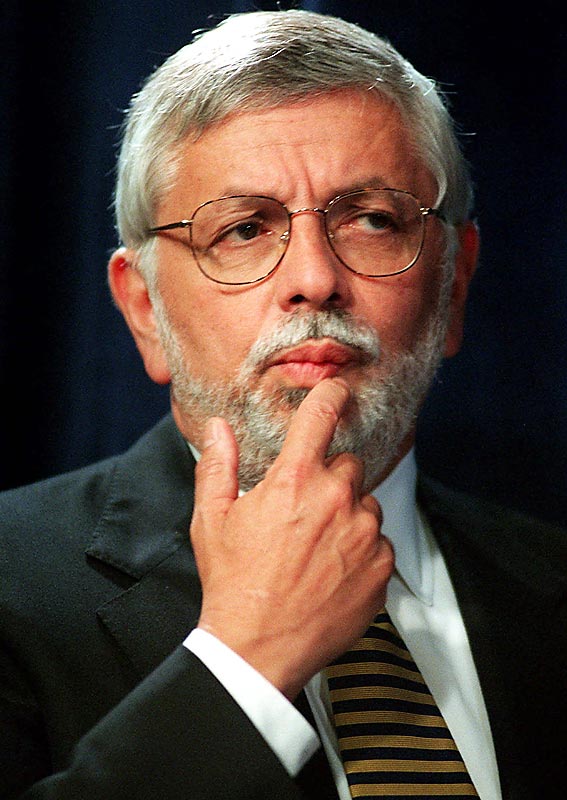Acknowledging the Competition
This past couple of weeks the sports world has been chock-full of big time, high stakes contests ranging from the recent Super Bowl to what was in my little sports bubble, an incredibly entertaining and interesting NBA game last Friday night between the Los Angeles Lakers and the New York Knicks.
While in different sports, and certainly having wildly different levels of significance, these contests possessed some interesting back stories, both around how teams and players perceive and communicate about their competition.
Two data points to submit -
Point One - shortly after the New York Giants victory in the Super Bowl, a full-page congratulatory advertisement in the New York Daily News was taken out in acknowledgement of the Giants fantastic victory, and commending the Giants organization for the 'passion' and 'toughness' they exhibited in winning the championship. 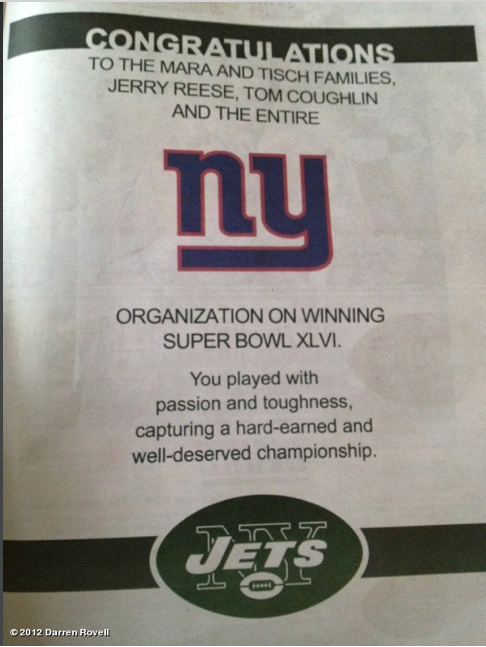
The organization that placed the ad? Not the New England Patriots, the team that the Giants actually defeated in the Super Bowl, but the New York Jets. The Jets, as the 'other' professional football team in the greater New York City area have had a long history of futility, and after some recent better play in the last few seasons, saw themselves as a serious title contender. Sadly for the Jets, their season ended in disappointing fashion, failing to even qualify for the league playoffs, in no small part to a loss to the eventual Super Bowl Champion Giants in a late-season game.
Point Two - Shortly before last Friday's Lakers-Knicks game at Madison Square Garden in New York, reporters asked Lakers' star Kobe Bryant, an all-time great player, and 5-time NBA title winner what he thought about the recent and surprising play of the Knicks young point guard Jeremy Lin. Remember, Kobe is a pantheon-type player, one of the greatest ever, and Lin, while a sensation at the moment, has played only a handful of games of note in the NBA.
From the transcript of the exchange between Kobe and the press:
"I know who he (Lin) is, but I don't really know what's going on too much with him. I don't even know what he's done. Like, I have no idea what you guys are talking about. I'll take a look at it tonight though."
[Asked again about Lin] "I don't even know what the [fudge] is going on. What the [fudge] is going on? Who is this kid? I've heard about him and stuff like that, but what's he been doing? Is he getting like triple doubles or some [stuff]? He's averaging 28 and eight? No [stuff]. If he's playing well, I'll just have to deal with him."
[Would he consider guarding Lin?] "Jesus Christ. Let's not get ahead of ourselves."
It's hard to say how much Kobe really knew about the Knicks' Lin, and how much of his remarks were meant to make sure that the rest of the league, the reporters, and the fans know that he remains one of the top players in the league, on what is still a good team, and what the [fudge] are you guys doing asking me about some rookie no one's ever heard of before three days ago.
The difference in the two approaches?
The Jets are the second-class citizens in the New York football scene. And their local rivals the Giants have just won their second Super Bowl in 4 years, (and 4th overall). The Jets have been looking up at the Giants for the better part of their history. Kobe, on the other hand, has been one of the very best players in the NBA for over a decade, winning 5 titles in the process, and Lin, well despite this past week of excitement, has achieved about 1/1,000,000th of what Kobe has done in his career.
For the Jets management, taking out the ad congratulating the Giants sends a pretty strong message to the players, coaches, and fans that their job is not nearly done, and to see what success looks like well, they don't have to look far. It is about making sure the Jets understand that and hopefully to keep them motivated to do something about that.
And for Kobe, the best player on the Lakers and the team leader? His comments are clearly meant to make sure his teammates realize that they are still the Lakers, and he is still Kobe Bryant, and that they, and the rest of the league should not forget that. A leader on a traditionally great team probably has to take that tack, and to keep up the team's swagger and confidence.
What do you think - does your position on the pecking order influence and factor in to what you say about your competition?
Does what you say about the competition have any effect on the morale of your staff?
Postscript - The Knicks, led by Jeremy Lin's 38 points did beat the Lakers last Friday. Kobe played pretty well (34 points 10 boards), but the Knicks had too much #LinSanity going for them.
 Organization,
Organization,  sports tagged
sports tagged  Jeremy Lin,
Jeremy Lin,  Mamba,
Mamba,  Sports,
Sports,  class,
class,  competition
competition  Email Article
Email Article 
 Print Article
Print Article 
